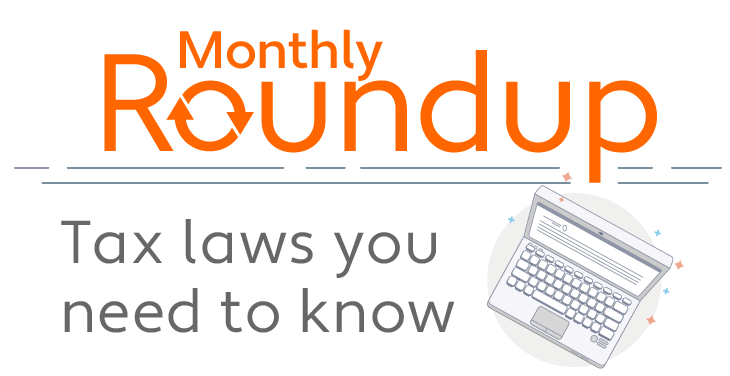Sleeping in North Carolina, waking in South Carolina – Wacky Tax Wednesday
We Americans take pride in the states we call home. Having grown up in a small New England state, I’m familiar with the strong sense of state pride people can have. I was from New Hampshire, not Maine, Massachusetts, or Vermont. Our neighboring states were lovely places to visit, but it was clear to me as a child that they were somehow lesser than. It now occurs to me that, in the eyes of my father, their shortcomings centered on politics and taxes.
I still identify with New Hampshire, but home is Washington. Though I sometimes dream of decamping to Oregon, California or, these days, any foreign country that will take us, I feel rooted here. I can’t imagine what it would feel like for our family to go to bed one night in our home in Washington and have us all wake up the next morning in Idaho. But that’s essentially what happened to approximately 20 households and two businesses located along the North and South Carolina border when the border between the two states was moved.
The boss will never know
Back in 1735, surveyors left the Atlantic Coast tasked with a straightforward charge: find the 35th Parallel, drop a stake, and create a border between the British colonies of North Carolina and South Carolina. Unfortunately, the job was botched. (In the surveyors’ defense, the dense forest and swamp proved hard-going, and they sometimes weren’t paid; can you blame them for getting close, saying “Good enough,” and going home?) And unfortunately, a 1764 survey party sent out to verify and continue the job made even more of a mess of it. By the early 1900s, no one knew exactly where the border was. (Note to surveyors: it’s best to mark boundaries with something more permanent than trees and fence posts.)
Modern advances in surveying and cooperation between the two states helped find it, and by 2013, after a 20-year long joint effort by the two states, the boundary was reestablished. Perhaps not surprisingly given the circumstances, it takes a few unexpected twists and turns, spilling into South Carolina here, North Carolina there. Alas, more than 150 properties were no longer in, or entirely in, the state they started out in. In some areas, the border moved more than 100 yards — enough to relocate or bisect homes and businesses (New York Times).
Shifting municipal or county boundaries within one state can impact a variety of taxes, including property tax and sales and use tax rates. Shifting the border between states can lead to other issues, such as school attendance and voting. It can also impact product taxability. For example, the Lake Wylie Mini Mart used to be in York County, South Carolina, where gas tax is fairly low and sales of beer and fireworks are permitted. It’s now in Gaston County, North Carolina, where the gas tax is higher and the sale of beer and fireworks is prohibited.
A taxing move
The two Carolinas, in the spirit of neighborliness, have worked out a compromise to improve the situations of unhappy people who suddenly find themselves or their business with a new zip code. For the most part, the mini mart is allowed to continue business as if still in South Carolina: until the business changes hands, it can charge the lower South Carolina gas tax and sell the contraband fireworks and alcohol. Yet it must charge and remit South Carolina sales tax on other taxable items.
South Carolina Senate Bill 667 (Act No. 270) clarifies the location of the boundary between North and South Carolina and addresses the boundary change’s impact on “persons whose residences and businesses are determined to be located in South Carolina rather than North Carolina.” For income and property tax purposes, the Act considers the change to take effect on January 1, 2017. North Carolina Senate Bill 575 provides similar guidance.
According to the South Carolina Department of Revenue, “Any business required to collect or pay sales and use taxes or admissions taxes whose business location changes from North Carolina to South Carolina as a result of the boundary clarification is required to obtain a South Carolina retail license or admissions tax license for that location before January 1, 2017, and must begin collecting and paying South Carolina sales and use taxes or admissions taxes on January 1, 2017.” The department has announced additional policies relating to cigarette and tobacco taxes, motor fuel taxes and user fees, and back taxes and refunds.
If the border change impacts how affected businesses handle taxes, it also impacts the reluctant residents and businesses that sell taxable goods and services to them, such as Amazon.com. Businesses will have to adjust point of sale systems to account for the fact that new sales and use tax rates and different product taxability rules now apply to affected addresses (North Carolina recently expanded sales tax to a number of previously exempt services, and it may expand them even further). Nexus rules may also be different. Although Amazon has nexus and charges sales tax in both North and South Carolina, other businesses may only have nexus in one or the other.
Shifts in state borders are not as rare as you might think, and North and South Carolina deserve kudos for settling the quandary in such a neighborly fashion. When New York lost a landfill near Ellis Island to New Jersey, then Mayor Rudolph W. Giuliani remarked that “It must have been a fix.” And when Georgia was suffering from a severe drought a few years back and asked Tennessee for access to drinking water — access Georgia said would already belong to Georgia but for an early survey error — Rep. Jason Powell (D-Nashville) replied, “Georgia can keep its greedy hands off our land and its thirsty mouths away from our water.”
Moving a state border can have serious ramifications. It can impact access to water, landfills, and even schools, and it affects tax revenue. For some, it may threaten our very identities. So let’s hope that we all wake up tomorrow where we went to bed tonight.
Want more sales tax stories? Sign up for our newsletter.

The Avalara Tax Changes midyear update is here
Trusted by professionals, this valuable resource simplifies complex topics with clarity and insight.
Stay up to date
Sign up for our free newsletter and stay up to date with the latest tax news.













